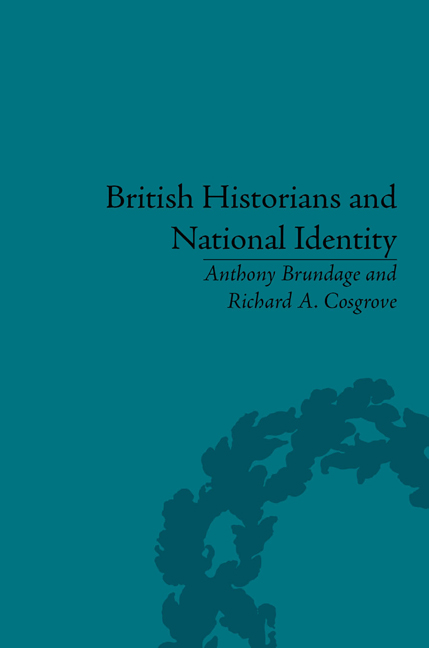Book contents
- Frontmatter
- CONTENTS
- Dedication
- Acknowledgements
- Introduction
- 1 Demythologizing the Nation's Past: David Hume's History of England
- 2 Catharine Macaulay's Vindication of Radicalism and the Republican Tradition
- 3 Reassessing Religion and the National Narrative: John Lingard and the English Reformation
- 4 Placing the Constitution at the Heart of National Identity: Henry Hallam and Constitutional History
- 5 Thomas Babington Macaulay: Writing the History of a Progressive People
- 6 The Glories of the Reformation and the Origins of Empire: J. A. Froude's Celebration of the Tudor Era
- 7 Edward Augustus Freeman: Liberal Democracy and National Identity
- 8 William Stubbs: The Continuity of English History as National Identity
- 9 Celebrating the People: J. R. Green's Short History
- 10 Samuel Rawson Gardiner: Incorporating Dissent into the National Story
- 11 In Thrall to English Tradition and Character: G. M. Trevelyan's Panoramic Histories of the Island Race
- 12 The Anglosphere as Global Model: Winston Churchill's History of the English-Speaking Peoples
- Conclusion
- Notes
- Works Cited
- Index
10 - Samuel Rawson Gardiner: Incorporating Dissent into the National Story
- Frontmatter
- CONTENTS
- Dedication
- Acknowledgements
- Introduction
- 1 Demythologizing the Nation's Past: David Hume's History of England
- 2 Catharine Macaulay's Vindication of Radicalism and the Republican Tradition
- 3 Reassessing Religion and the National Narrative: John Lingard and the English Reformation
- 4 Placing the Constitution at the Heart of National Identity: Henry Hallam and Constitutional History
- 5 Thomas Babington Macaulay: Writing the History of a Progressive People
- 6 The Glories of the Reformation and the Origins of Empire: J. A. Froude's Celebration of the Tudor Era
- 7 Edward Augustus Freeman: Liberal Democracy and National Identity
- 8 William Stubbs: The Continuity of English History as National Identity
- 9 Celebrating the People: J. R. Green's Short History
- 10 Samuel Rawson Gardiner: Incorporating Dissent into the National Story
- 11 In Thrall to English Tradition and Character: G. M. Trevelyan's Panoramic Histories of the Island Race
- 12 The Anglosphere as Global Model: Winston Churchill's History of the English-Speaking Peoples
- Conclusion
- Notes
- Works Cited
- Index
Summary
Compared to Victorian colleagues, Samuel Rawson Gardiner (1829–1902) did not generate much controversy about his scholarship nor has he retained the interest of posterity until recently. Gardiner lived a comparatively quiet life, with few friends inside or outside the history community and with no connections such as bound the triumvirate of Freeman, Green and Stubbs. Without the independence of a private income, after earning a degree at Christ Church College, Oxford in 1851, Gardiner made the study of English history, especially the seventeenth century, his life's work. Beginning with two volumes in 1863, Gardiner eventually covered the years 1603–56 in a total of eighteen volumes. The first volumes attracted little attention: the first two volumes originally sold only 100 copies and the next two just 500. Not until the 1880s did the ongoing work, either singly or in sets, earn their author any profit. Gardiner had finally drawn the attention of the public and the nascent historical profession.
Gardiner eventually became a professor at King's College, London in 1877. In 1882 he received a civil list pension of £150 annually from the Gladstone government and a research fellowship at All Souls College, Oxford worth another £200 per annum. At this point his financial situation stabilized sufficiently to ensure the continuation of his work. When this All Souls stipend ended, Merton College, Oxford elected him to another fellowship.
- Type
- Chapter
- Information
- British Historians and National IdentityFrom Hume to Churchill, pp. 145 - 160Publisher: Pickering & ChattoFirst published in: 2014



